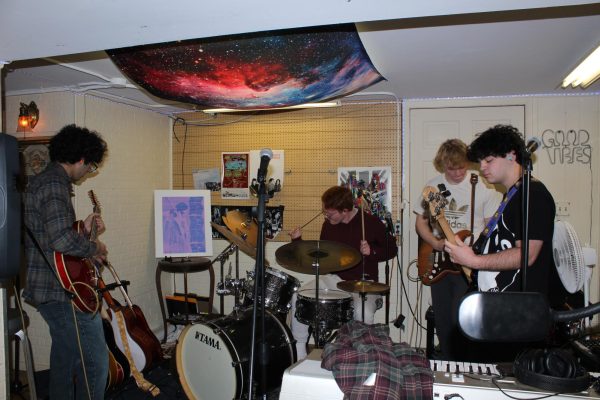Sandworms, spaceships, and Spice
Dune combines visual, audio effects into impactful sci-fi epic
November 12, 2021
“The desert takes the weak.” This line spoken by the main antagonist of Dune resonates it’s dark truth throughout the film and immerses the audience into a world of fantastical environments and thrilling futuristic battles.
Based on Frank Herbert’s 1965 novel of the same name, Dune begins the generation-spanning story of a universe far in the future, focused on wars and political rivalries. A sci-fi triumph of film, director Denis Villenevue excels in telling the tale through cinema.
Villenevue, who has previously directed 2017’s Blade Runner: 2049, and 2013’s Prisoners, fills the movie with entrancing colors and wide, grand shots, a style which Villenevue has become renowned for.
Dune begins with the House of Atreides, a clan led by Duke Leto Atreides (Oscar Isaac) and his wife Lady Jessica (Rebecca Furguson), taking ownership of the planet Arrakis. A planet covered by sand and scorching heat, Arrakis is the only source of a substance known as “Spice” in the universe, as well as home to the Fremen, the native nomads of the planet. This “Spice” extends human vitality and gives the ability to travel through space.
The transfer of the planet to Atreides is not without conflict, as House Harkonnen, led by Duke Vladimir Harkonnen (Stellan Skarsgård), wishes to remain the dominant producer of Spice in the universe. The heir to the throne of Atreides, Paul Atreides (Timothee Chalamet), is being trained to combat the Harkonnen threat and take control of the planet after he inherits the throne.
Conflict with both the Fremen and the Harkonenns over control of Arrakis set the stage for Paul to rise to the throne and fight for his people’s survival.
The film mirrors the novel nearly identically, and as such follows the book in focusing less on the technology of the world, and more on the human politics and relations within the Dune universe. Besides spaceships and space travel, the technology is not too bewildering, and it takes a backseat to character development. It feels much more of a fantasy than a sci-fi, taking inspiration from medieval mythology, paralleling dragons as sandworms protect their Spice, knights as the soldiers who face hand to hand combat, and kings and queens ruling over grand cities. In lieu of large laser cannons and rifles, knives and swords are preferred weapons, invoking an ancient and medieval mood.
The soundtrack for Dune, created by esteemed composer Hans Zimmer, is unlike any I’ve yet to hear for a film. The Sahara-esque theme with powerful vocal chants and mysterious while grand electrical synth instruments sets the mood and setting of the film extremely well, and is captivating when matched with the staggering cinematography of Villenevue.
Dune is available to stream on HBO Max until Nov. 21st, and is also in theaters for a limited time. For any lovers of the original novel, or those even mildly interested in sci-fi, Dune is a must see film, and one of the best of 2021 so far.








